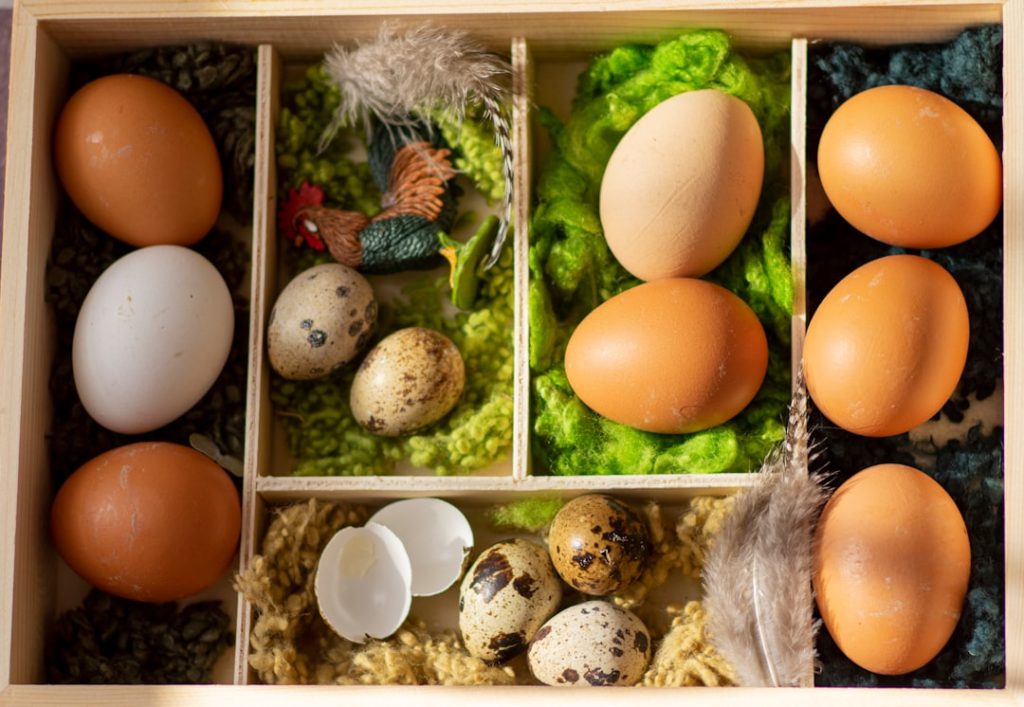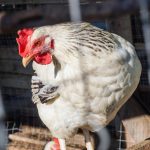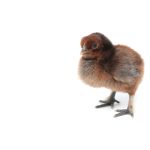When selecting a chicken breed for your location in Australia, several factors must be considered. Climate, space availability, and the intended purpose of the chickens are crucial in determining the most suitable breed. In warmer regions like Queensland and Northern Territory, heat-tolerant breeds such as Australorp and Rhode Island Red are popular due to their ability to withstand high temperatures and suitability for free-ranging in hot climates.
Conversely, in cooler regions like Tasmania and Victoria, cold-hardy breeds like Plymouth Rock and Orpington are preferred for their thick feathers and robust build, which help them endure colder temperatures. For egg production, breeds like Leghorn and Sussex are known for their high egg-laying capabilities. Dual-purpose breeds such as Australorp and Plymouth Rock are excellent choices for both egg and meat production.
It is crucial to research and consider the specific needs of your location before selecting a breed to ensure the health and productivity of your flock. Environmental factors unique to your location in Australia should also be taken into account. In suburban areas with limited space, smaller breeds like bantams or Pekin chickens may be more suitable.
Rural settings with ample space can accommodate larger breeds such as Orpington or Brahma. If predators like foxes or snakes are common in your area, choosing breeds known for their alertness and ability to fend off predators, such as Sussex or Australorp, is important for flock safety. Noise levels should also be considered, especially in urban settings with close neighbors.
Breeds like the Silkie are known for their quiet and docile nature, making them suitable for noise-sensitive environments. By considering these location-specific factors, you can select a chicken breed that is well-suited to thrive in your particular environment.
Table of Contents
- 1 Building a Coop and Run for Your Chickens
- 2 Feeding and Nutrition for Healthy Chickens
- 3 Health and Disease Management
- 4 Egg Production and Collection
- 5 Handling and Socializing Your Chickens
- 6 Legal and Environmental Considerations for Keeping Chickens in Australia
- 7 FAQs
- 7.1 What is the purpose of keeping chickens in Australia?
- 7.2 What are the legal requirements for keeping chickens in Australia?
- 7.3 What are the key considerations for housing chickens in Australia?
- 7.4 What are some common chicken breeds suitable for Australian conditions?
- 7.5 What are the main health and welfare considerations for chickens in Australia?
- 7.6 What are some tips for maintaining a clean and healthy chicken coop in Australia?
Key Takeaways
- Consider climate and space when choosing a chicken breed for your location
- Build a secure coop and run to protect chickens from predators
- Provide a balanced diet with access to fresh water for healthy chickens
- Regularly monitor and maintain the health of your chickens to prevent diseases
- Collect eggs daily and provide a clean and comfortable nesting area for chickens
Building a Coop and Run for Your Chickens
Designing the Coop and Run
Building a coop and run for your chickens is an essential step in providing them with a safe and comfortable living environment. The coop should be well-ventilated to prevent moisture buildup and allow for proper air circulation. It should also be insulated to provide warmth in colder months and protection from extreme heat in warmer months. Additionally, the coop should have roosting bars for the chickens to perch on at night, as well as nesting boxes for them to lay their eggs. The run should be spacious enough to allow the chickens to move around freely and engage in natural behaviors like scratching and dust bathing.
Providing a Safe and Healthy Environment
Providing ample shade and shelter within the run is also important to protect the chickens from the elements. The run should be predator-proof, with sturdy fencing and a secure latching system on the door to keep out unwanted visitors. By building a well-designed coop and run, you can ensure that your chickens have a safe and comfortable home that meets their physical and behavioral needs.
Planning the Layout and Placement
When building a coop and run for your chickens, it’s important to consider the layout and placement of these structures within your property. The coop should be situated in an area that is well-drained and away from low-lying areas that may flood during heavy rain. It should also be positioned to receive natural sunlight while providing adequate shade during the hottest parts of the day. The run should be located in an open area with good visibility to allow you to keep an eye on your flock and monitor their behavior.
Feeding and Nutrition for Healthy Chickens
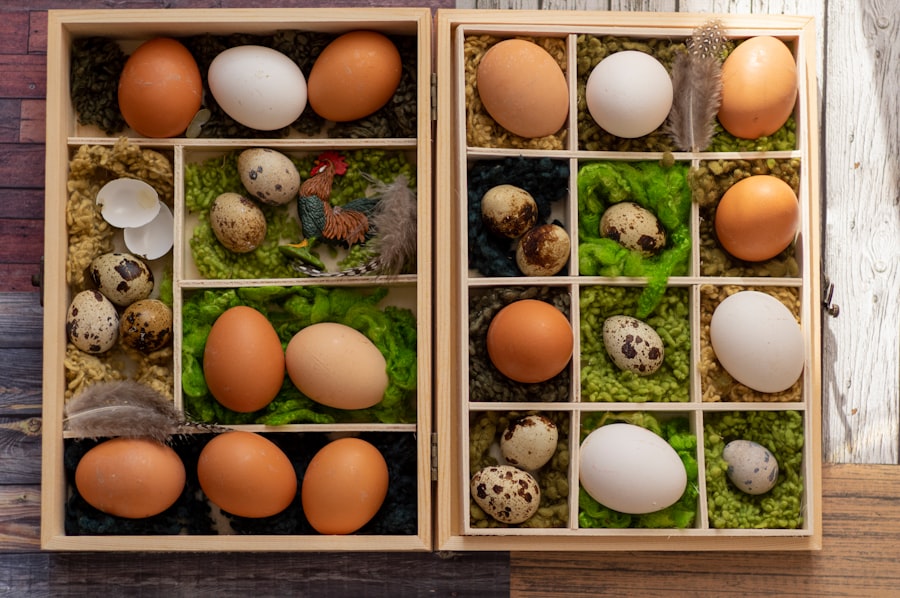
Feeding and nutrition play a crucial role in maintaining the health and well-being of your chickens. A balanced diet is essential for supporting egg production, growth, and overall vitality. A good quality commercial feed formulated specifically for chickens is an excellent foundation for their diet.
This feed should contain essential nutrients such as protein, carbohydrates, vitamins, and minerals to support their growth and development. Additionally, providing access to fresh water at all times is essential for hydration and digestion. Supplementing their diet with kitchen scraps, fruits, vegetables, and grains can provide additional nutrients and variety to their diet.
It’s important to avoid feeding them foods that are toxic to chickens, such as avocado, chocolate, or raw beans. Providing access to grit is also important for aiding in digestion, as it helps chickens break down food in their gizzards. By ensuring that your chickens have access to a balanced diet that meets their nutritional needs, you can help them thrive and lead healthy lives.
In addition to providing a balanced diet, it’s important to consider the feeding habits of your chickens and adjust their feeding routine accordingly. Chickens are natural foragers and enjoy scratching and pecking at the ground for insects and plants. Allowing them access to a free-range area where they can engage in these natural behaviors can provide mental stimulation and additional nutrients from their environment.
If free-ranging is not possible, providing enrichment activities such as hanging treats or scattering food around their run can help simulate natural foraging behaviors. It’s also important to monitor their food intake and adjust portion sizes based on their activity level, age, and environmental conditions. During molting or periods of increased egg production, chickens may require additional protein or calcium supplements to support their needs.
By observing their behavior and adjusting their feeding routine accordingly, you can ensure that your chickens receive the nutrition they need to stay healthy and productive.
Health and Disease Management
Maintaining the health of your chickens is essential for ensuring their well-being and productivity. Regular health checks are important for monitoring their overall condition and identifying any signs of illness or injury. Checking their eyes, comb, wattles, feet, and vent for any abnormalities can help detect early signs of health issues.
Additionally, observing their behavior, appetite, and egg production can provide valuable insights into their health status. Providing a clean living environment with good ventilation, proper sanitation, and regular removal of droppings can help prevent the spread of diseases. Quarantining new birds before introducing them to your existing flock can also help prevent the transmission of diseases.
It’s important to familiarize yourself with common poultry diseases in Australia, such as Marek’s disease, infectious bronchitis, and coccidiosis, so that you can recognize symptoms early on and seek appropriate veterinary care if needed. By implementing good hygiene practices and monitoring your flock’s health regularly, you can help prevent disease outbreaks and ensure the overall well-being of your chickens. In addition to proactive measures for disease prevention, it’s important to have a plan in place for managing potential health issues that may arise in your flock.
Establishing a relationship with a poultry veterinarian who can provide guidance on vaccination schedules, treatment options, and disease management is essential for addressing health concerns effectively. Keeping a well-stocked first aid kit with essential supplies such as wound care products, electrolytes, and medications can help you respond promptly to injuries or illnesses. It’s also important to quarantine sick or injured birds from the rest of the flock to prevent the spread of illness.
Regularly cleaning and disinfecting feeders, waterers, and living quarters can help reduce the risk of disease transmission within your flock. By being proactive in managing the health of your chickens and seeking professional guidance when needed, you can help ensure that they receive proper care and support when facing health challenges.
Egg Production and Collection
Egg production is one of the primary reasons many people keep chickens, so understanding how to maximize egg production while ensuring egg quality is essential for a successful flock. Providing a balanced diet with adequate protein levels is crucial for supporting healthy egg production. Additionally, ensuring that your hens have access to clean nesting boxes with comfortable bedding can encourage them to lay eggs in a suitable environment.
Collecting eggs regularly helps prevent them from being damaged or soiled by other hens or predators. It’s important to handle eggs gently to avoid cracking or contaminating them with bacteria. Storing eggs properly in a cool environment with consistent temperature control can help maintain their freshness and quality.
By implementing good management practices that support healthy egg production and handling techniques that preserve egg quality, you can enjoy a steady supply of fresh eggs from your flock. In addition to maximizing egg production, it’s important to monitor egg quality by observing factors such as shell integrity, yolk color, and overall appearance. Providing calcium supplements such as oyster shell or crushed eggshells can help support strong shell formation and prevent issues like thin or soft-shelled eggs.
Monitoring the overall health of your hens through regular health checks can also help identify any underlying issues that may impact egg quality. It’s important to promptly address any signs of stress or illness in your hens that may affect their egg-laying capabilities. By maintaining a healthy environment with proper nutrition and attentive care, you can help ensure that your hens produce high-quality eggs consistently.
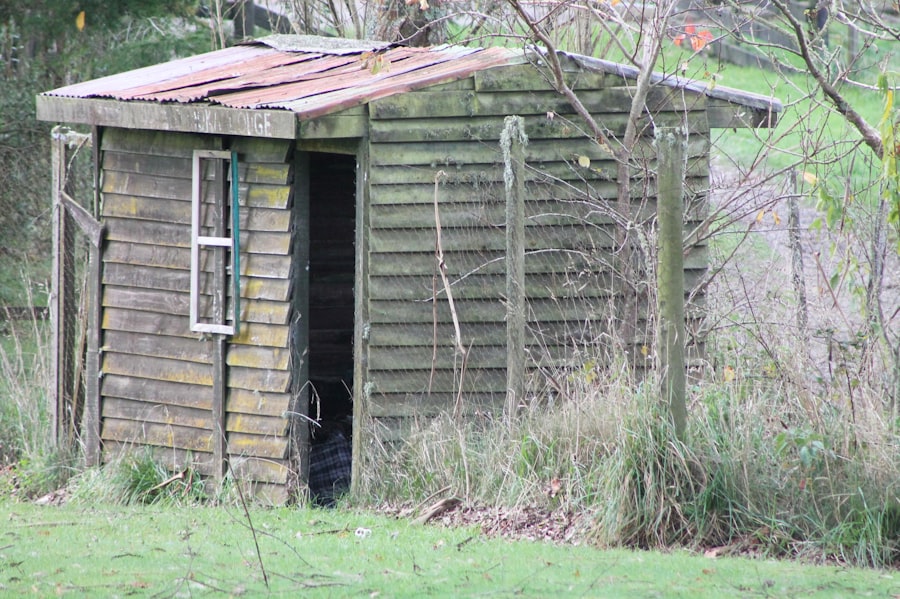
Building Trust from an Early Age
Spending time with your chickens from an early age can help them become accustomed to human interaction and develop trust towards you as their caretaker. Gentle handling techniques, such as picking them up carefully with both hands under their body, can help reduce stress and build positive associations with human contact.
Creating a Positive Experience
It’s essential to approach them calmly and speak softly to avoid startling them during handling sessions. Providing treats during interactions can also help reinforce positive associations with human contact. Socializing your chickens by allowing them access to outdoor areas where they can explore freely can provide mental stimulation while promoting natural behaviors like scratching and dust bathing.
Establishing Boundaries and Encouraging Cooperation
By investing time in handling and socializing your chickens regularly, you can build a strong bond with them while ensuring their comfort around humans. In addition to handling techniques, it’s important to establish boundaries with your chickens to ensure both their safety and your own. Teaching them basic commands such as “come” or “stay” can help manage their behavior during interactions while promoting obedience. Monitoring their body language during handling sessions is also crucial to ensure they are comfortable and not exhibiting signs of stress or discomfort. Providing opportunities for positive reinforcement through treats or praise when they exhibit desired behaviors can help encourage cooperation during handling sessions.
Legal and Environmental Considerations for Keeping Chickens in Australia
When keeping chickens in Australia, it’s important to be aware of legal regulations regarding poultry keeping in your area. Local councils may have specific bylaws related to keeping chickens that address issues such as coop size, distance from property boundaries, maximum number of birds allowed per property, noise restrictions, waste management guidelines, and more. Familiarizing yourself with these regulations is essential for ensuring compliance with local laws while keeping chickens on your property.
Additionally, being mindful of environmental considerations such as waste management is important for minimizing the impact of chicken keeping on surrounding ecosystems. Properly managing chicken waste through composting or disposal methods that comply with local regulations can help prevent environmental pollution while maintaining a clean living environment for your flock. In addition to legal considerations, it’s important to be mindful of potential environmental impacts associated with chicken keeping in Australia.
Proper waste management practices such as composting chicken manure can help reduce environmental pollution while providing valuable organic fertilizer for gardens or crops. Implementing measures to prevent soil erosion around chicken coops or runs can help protect local ecosystems from degradation caused by runoff or soil disturbance. Additionally, being mindful of noise levels from crowing roosters or clucking hens is important for maintaining positive relationships with neighbors in urban or suburban areas where noise may be a concern.
By being aware of legal regulations related to poultry keeping while implementing environmentally responsible practices on your property, you can ensure that your chicken keeping activities have minimal impact on local ecosystems while complying with relevant laws. In conclusion, keeping chickens in Australia involves careful consideration of various factors such as breed selection based on location-specific needs, building appropriate housing structures that meet the physical requirements of chickens while considering layout placement within your property space availability; providing balanced nutrition through commercial feed supplemented with kitchen scraps; monitoring health regularly; collecting eggs properly; handling socializing techniques; being aware of legal environmental considerations related poultry keeping activities on property compliance relevant laws; implementing environmentally responsible practices minimize impact local ecosystems while complying relevant laws; ultimately ensuring welfare productivity flock maintained at optimal levels throughout year-round care management practices implemented by caretaker responsible stewardship animals environment alike.
If you’re looking for more information on building a chicken coop, you might want to check out this article on how big a coop needs to be for a chicken. It provides helpful tips and guidelines for creating a suitable living space for your feathered friends.
FAQs
What is the purpose of keeping chickens in Australia?
Keeping chickens in Australia can serve multiple purposes, including providing a sustainable source of fresh eggs, natural pest control in the garden, and the opportunity to engage in a rewarding and educational hobby.
What are the legal requirements for keeping chickens in Australia?
The legal requirements for keeping chickens in Australia vary by state and local council. Generally, regulations cover the number of chickens allowed, coop and run specifications, and distance from neighboring properties. It is important to check with local authorities to ensure compliance.
What are the key considerations for housing chickens in Australia?
When housing chickens in Australia, it is important to consider factors such as protection from extreme weather conditions, adequate space for the number of chickens, predator-proofing the coop and run, and providing access to fresh water and nutritious feed.
What are some common chicken breeds suitable for Australian conditions?
Common chicken breeds suitable for Australian conditions include the Australorp, Isa Brown, Rhode Island Red, and Sussex. These breeds are known for their ability to adapt to various climates and their excellent egg-laying capabilities.
What are the main health and welfare considerations for chickens in Australia?
Main health and welfare considerations for chickens in Australia include providing a balanced diet, regular access to clean water, appropriate shelter, and protection from predators and diseases. Regular health checks and access to veterinary care are also important for maintaining the well-being of chickens.
What are some tips for maintaining a clean and healthy chicken coop in Australia?
To maintain a clean and healthy chicken coop in Australia, it is important to regularly remove soiled bedding, provide adequate ventilation, and regularly inspect for signs of pests or disease. Additionally, implementing a regular cleaning schedule and using natural or non-toxic cleaning products can help promote a healthy environment for chickens.
Meet Walter, the feathered-friend fanatic of Florida! Nestled in the sunshine state, Walter struts through life with his feathered companions, clucking his way to happiness. With a coop that’s fancier than a five-star hotel, he’s the Don Juan of the chicken world. When he’s not teaching his hens to do the cha-cha, you’ll find him in a heated debate with his prized rooster, Sir Clucks-a-Lot. Walter’s poultry passion is no yolk; he’s the sunny-side-up guy you never knew you needed in your flock of friends!

